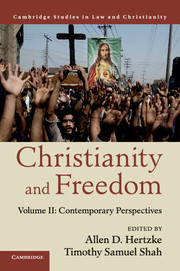Book contents
- Frontmatter
- Colophon
- Contents
- Contributing Authors
- Acknowledgments
- Introduction: Christianity and Freedom in the Contemporary World
- 1 Persecution in the Context of Religious and Christian Demography, 1970–2020
- 2 Patterns and Purposes of Contemporary Anti-Christian Persecution
- 3 Where the Spirit Leads: Global Pentecostalism and Freedom
- 4 Christianity among the Marginalized: Empowering Poor Women in India
- 5 Transnational Christian Networks for Human Dignity
- 6 The Growth and Dynamism of Chinese Christianity
- 7 Christianity and Religious Freedom in Indonesia since 1998
- 8 Christianity and Freedom in India: Colonialism, Communalism, Caste, and Violence
- 9 Vietnam: Christianity's Contributions to Freedoms and Human Flourishing in Adversity
- 10 The Challenge and Leaven of Christianity in Pakistan
- 11 Christianity and the Challenge of Religious Violence in Northern Nigeria
- 12 Copts of Egypt: Defi ance, Compliance, and Continuity
- 13 Between the Hammer and the Anvil: Indigenous Palestinian Christianity in the West Bank
- 14 Christians in the State of Israel: Between Integration and Emigration
- 15 Arab Muslim Attitudes toward Religious Minorities
- 16 They That Remain: Syrian and Iraqi Christian Communities amid the Syria Confl ict and the Rise of the Islamic State
- Index
2 - Patterns and Purposes of Contemporary Anti-Christian Persecution
Published online by Cambridge University Press: 05 February 2016
- Frontmatter
- Colophon
- Contents
- Contributing Authors
- Acknowledgments
- Introduction: Christianity and Freedom in the Contemporary World
- 1 Persecution in the Context of Religious and Christian Demography, 1970–2020
- 2 Patterns and Purposes of Contemporary Anti-Christian Persecution
- 3 Where the Spirit Leads: Global Pentecostalism and Freedom
- 4 Christianity among the Marginalized: Empowering Poor Women in India
- 5 Transnational Christian Networks for Human Dignity
- 6 The Growth and Dynamism of Chinese Christianity
- 7 Christianity and Religious Freedom in Indonesia since 1998
- 8 Christianity and Freedom in India: Colonialism, Communalism, Caste, and Violence
- 9 Vietnam: Christianity's Contributions to Freedoms and Human Flourishing in Adversity
- 10 The Challenge and Leaven of Christianity in Pakistan
- 11 Christianity and the Challenge of Religious Violence in Northern Nigeria
- 12 Copts of Egypt: Defi ance, Compliance, and Continuity
- 13 Between the Hammer and the Anvil: Indigenous Palestinian Christianity in the West Bank
- 14 Christians in the State of Israel: Between Integration and Emigration
- 15 Arab Muslim Attitudes toward Religious Minorities
- 16 They That Remain: Syrian and Iraqi Christian Communities amid the Syria Confl ict and the Rise of the Islamic State
- Index
Summary
EXECUTIVE SUMMARY
The contemporary Christian church exists in every country; in most it is growing, and in many it is persecuted. Currently, Christians are the most widely persecuted religious group in the world, suffering discrimination, harassment, repression, and violence in approximately 133 countries, and, in some areas, particularly in the Muslim majority world, this is increasing. This persecution is also often underreported or downplayed.
There are currently four major patterns of anti-Christian persecution; while these do not include all instances, they cover more than 90 percent of them. These patterns are (1) the remaining self-professed Communist countries – China, Vietnam, Laos, North Korea, and Cuba – where the state is the usual persecutor; (2) South Asian religious nationalism – in India, Nepal, Sri Lanka, and Bhutan – where reactionary Hindu and Buddhist elements attack religious minorities and persecution is primarily societal rather than state-directed, though states or local governments can be complicit; (3) the Muslim majority world, where although it does not involve the most Christians, it is the site of the most widespread persecution and is the area where persecution is increasing; (4) post-Communist, national security, and other authoritarian states, including Burma, Ethiopia, Eritrea, Uzbekistan, Turkmenistan, and Belarus.
While they do not rise to the level of persecution, there are also increasing restrictions on religious freedom in the West caused by newer forms of secularism, which I also briefly describe.
These categories are not precise, since countries themselves do not reduce to simple patterns – for example, Burma has combined a national security state with religious nationalism – but they do indicate the major trends.
The reasons for persecution are varied and do not constitute a unitary “war” on Christians. But one common feature is that in the modern age, the traditional Christian belief that sacerdotium (church) and regnum (state) were two distinct bodies manifests itself practically in a denial that the state is all-encompassing or the ultimate arbiter of human life. Hence, this belief is a foundation for social and political pluralism. Accordingly, Christians are often subject to persecution by those who have a monistic conception of the social order and the state – that there is one order of authority in society whose reach applies to every person and institution and to which all must submit. Contemporary monisms include communism, other authoritarianisms, radical Islamist conceptions, religious nationalisms, and several contemporary secularisms.
- Type
- Chapter
- Information
- Christianity and Freedom , pp. 58 - 86Publisher: Cambridge University PressPrint publication year: 2016
- 2
- Cited by



